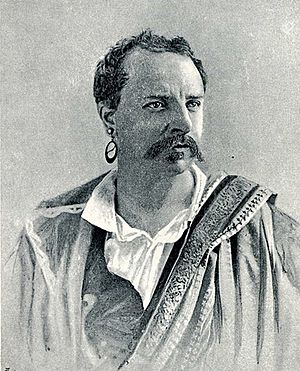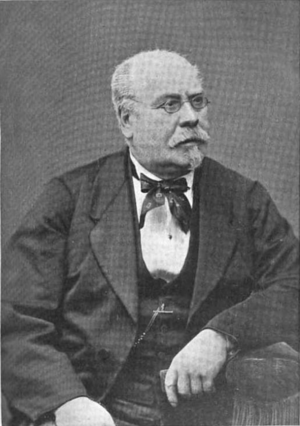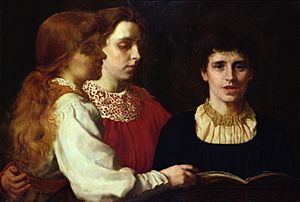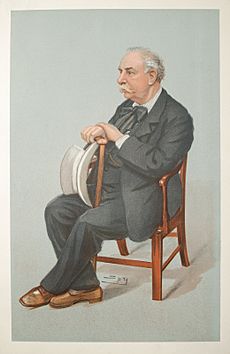Charles Santley facts for kids
Sir Charles Santley (born February 28, 1834 – died September 22, 1922) was a famous English singer. He was known for his powerful voice as a baritone (a male singing voice between tenor and bass). Santley became the most important English male concert and opera singer during the Victorian era. People called his career 'the longest, most distinguished and most versatile vocal career which history records.'
Santley performed in many big opera and oratorio shows in Great Britain and North America. He also gave many solo concerts. He first performed in Italy in 1857 after studying singing there. He then decided to live in England for the rest of his life, only traveling overseas sometimes. A major moment in his stage career was in 1870. He starred in the first Wagner opera ever performed in London, The Flying Dutchman. This happened at the Theatre Royal, Drury Lane. Santley stopped performing in operas in the 1870s. He wanted to focus on concert singing, which was very popular and paid well.
Santley also wrote books about how to sing. He wrote two sets of books about his life and memories.
Contents
Early Life and Musical Journey
Charles Santley was born in Liverpool, England. His father, William Santley, was a bookbinder, organist, and music teacher. Charles sang alto (a high male voice) in a church choir when he was a boy. His voice started to change before he turned fourteen. His father wanted him to sing tenor (a high male voice).
When he was fifteen, he joined the Liverpool Philharmonic Society as a second tenor. He sang in concerts when the Philharmonic Hall first opened. But when he was about seventeen, he decided to sing in the bass clef, meaning his voice became much lower. People then said he was a bass singer.
Santley also played the violin in musical groups. He sang in choirs for famous works like Haydn's The Creation and Handel's Messiah. He even sang with famous singers like Jenny Lind. He later became a bass soloist in a Catholic church.
In 1855, Santley went to Milan, Italy, to study singing. He chose to study with Gaetano Nava, who became a close friend. Nava taught him many comic opera roles. He also taught him how to sing with good technique as a baritone. Santley made his first stage performance on January 1, 1857, in Pavia, Italy. He sang as Dr. Grenvill in La traviata.
Becoming a Star: Oratorio and Concerts
In 1857, Santley came back to London. He made his first big appearance in Haydn's Creation. He was very nervous and almost stopped, but the audience cheered him on. A famous singing teacher, Manuel García, then offered to train him.
Santley quickly became known for his powerful voice in oratorio (a large musical work for orchestra, choir, and soloists, usually based on a religious story). He first sang in Mendelssohn's Elijah in 1858. He became one of the best singers of this piece for over 50 years! He also sang Elijah and Messiah every year in Manchester from 1858 until 1907.
He performed at many important music festivals across England, like the Birmingham Triennial Music Festival and the Leeds Festival. In 1862, he sang at the Philharmonic Society's 50th Jubilee Concert. He shared the stage with other legendary performers like Jenny Lind.
In 1871–72, Santley went on a very successful concert tour in the United States and Canada. People loved his performances of popular songs and his oratorio singing.
Opera Career Highlights
Santley also had a brilliant career in opera. In 1859, he made his debut at Covent Garden in London. He sang the role of Hoel in Meyerbeer's opera Dinorah. He also performed in English operas like Il trovatore and The Bohemian Girl.
He joined Mapleson's Italian opera company. He sang many important roles, including Di Luna in Il trovatore and Almaviva in The Marriage of Figaro. In 1863, he starred as Valentine in the first performance of Gounod's Faust in England. The composer, Gounod, even wrote a special song for Santley called Even bravest heart. This song is now very famous.
Santley performed with many of the greatest singers of his time, such as Thérèse Tietjens and Adelina Patti. He traveled to Barcelona and Milan to perform in operas there. In 1867, the Her Majesty's Theatre in London, where he often sang, burned down. Santley had sung the last notes ever heard in that theater before the fire.
After the fire, he continued to perform at other London theaters. In 1870, he made history by singing the role of The Dutchman in The Flying Dutchman. This was the first time a Wagner opera was performed in London.
Santley tried to start his own English Opera company at the Gaiety Theatre. He wanted to create a place for English lyric theater. He had some success with operas like Zampa and Fra Diavolo. However, his dream didn't fully come true, and he decided to leave the stage for a while.
In 1875, Carl Rosa convinced Santley to return to opera. He performed in many operas with Carl Rosa's company, including Le nozze di Figaro and a new English version of The Flying Dutchman. He performed The Flying Dutchman 50 times in London and on tour. His last opera performance was in 1876, except for a few special appearances later on.
Later Years and Legacy
After leaving the opera stage, Santley focused on concert and oratorio performances in England. He became a Roman Catholic in 1880. In 1887, Pope Leo XIII honored him by making him a Knight Commander of St Gregory the Great.
Santley was married twice. His first wife was Gertrude Kemble, who was also a singer. They had five children, and their daughter Edith also became a concert singer. After Gertrude died in 1882, he married Elizabeth Mary Rose-Innes.
He continued to travel and perform, touring Australia, New Zealand, the United States, Canada, and South Africa. He sang at the Birmingham festival for 30 years in a row! Famous writer George Bernard Shaw praised Santley's singing, calling it 'humanly speaking, perfect.'
From 1894, Santley spent more time teaching singing. He taught the famous Australian baritone Peter Dawson from 1903 to 1907.
In 1907, Santley celebrated 50 years of his singing career with a big concert at the Royal Albert Hall. In December of that year, he was made a knight by the King. He was the first singer to receive this special honor. He gave his final performance at Covent Garden in 1911. Even in 1915, when he was over 80, his voice was still clear and strong when he sang for Belgian refugees.
His Amazing Voice
Santley's voice was known for its beautiful sound. He was a master at singing music by Handel and Mozart. He sang with great rhythm and energy, making every performance feel fresh. His voice was also very even and smooth across all its notes. Music director Henry J. Wood said his voice ranged from a low E-flat to a high G. He said, 'All his low F's told – even to the remotest corners of the largest concert-hall while his top F's were as a silver trumpet.' His clear voice allowed him to sing for over 60 years! This might be because he didn't overwork his voice by staying on the opera stage for too long.
Recordings
Charles Santley made a few recordings, mostly of popular songs called ballads. He made his first recordings in 1903 for the Gramophone Company. Even though he was older, his voice was still strong and steady. One of his most famous recordings is 'Non piu andrai' from Mozart's Figaro. He sang it with great energy. He also recorded songs like 'Simon the Cellarer' and 'To Anthea'.
Books and Music
Santley wrote several books about singing and his life:
- Method of Instruction for a Baritone Voice (around 1872)
- Student and Singer, Reminiscences of Charles Santley (1893)
- The Singing Master (1900)
- The Art of Singing and Vocal Declamation (1908)
- Reminiscences of my Life (1909)
He also composed some music, including a Mass (a type of religious music) and a piece for orchestra. He wrote songs under the pen name Ralph Betterton.
|
 | William Lucy |
 | Charles Hayes |
 | Cleveland Robinson |





